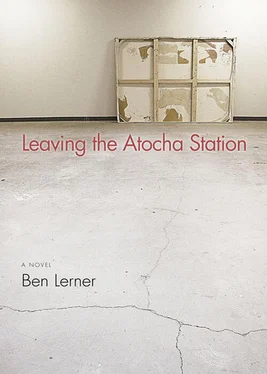“How do you understand their relationship?” I asked, trying to sound as though I’d pondered it for years.
“I don’t understand it,” she said, making it clear that was the point. Then she said things I could barely follow about the penultimate shot in the film, a continuous shot taken at “magic hour,” a phrase she said in English. I couldn’t understand what the shot looked like, but I understood that Antonioni had built, in order to achieve it, a special camera enclosed in a plastic sphere and fitted with various gyroscopes, whatever those were.
We ordered fresh drinks and Teresa talked about films, almost none of which I knew; maybe because we’d seen Orpheus, a movie about fluid boundaries, earlier that day, or because we were suddenly and impulsively arrived in a new city, or maybe because the bar was like a cave, I projected images to accompany her speech. Teresa appeared in those images, entered the films she was describing, and soon the films collapsed into one film, and it was her life I was imagining. She didn’t so much recount plots as shots and sequences as though they were plots. I pictured her at various ages and at the center of each scene, as if she had organized it around herself, and this struck me as a higher form of biography than the mere detailing of events. The more she talked the less aware of my presence she seemed; after several rounds, she asked for the check without consulting me and paid.
We left the bar and wound through the narrow streets and soon were back at our hotel. I rolled a spliff and asked her if she wanted any and she said no and I lay in bed smoking while she sat at the little table in the corner and worked on the translations, opening my notebook and hers. I asked her if she wanted to read me some and she again said no. I didn’t understand her method. She had no dictionary and asked no questions and I wondered if she was translating at all. After a while she came to bed and shut her eyes and I tried in my clumsy way to initiate some contact but she was totally if somehow gently unresponsive and soon she was asleep. For a long time, I watched her breathe.
When I woke she was reading Ashbery beside me. I wondered if she’d seen the pills in my bag. She smiled to indicate whatever distance had established itself between us the previous night had closed. Her breath smelled terrible and I told myself to commit that fact to memory, to remember it the next time I was intimidated by her unwavering grace. I told her I was going out for coffee. I got dressed, took my bag, and stumbled downstairs and out onto the street and walked until I found a café. Right as I was about to order, I realized I had no money; I left the café to find an ATM. Eventually the stone street widened into a modern avenue and I found a Deutsche Bank, where I withdrew the unreal currency. Still half-asleep, I put the cash in my wallet, and began to walk in what I thought was the direction I had come from, but after a few blocks I realized I was wrong. I retraced my steps and passed the bank but my confusion deepened; maybe I’d been right before. I asked a man, probably Roma, who was sitting in a doorway, where El Barrio Gótico was. He pointed and, although I headed in that direction for many minutes, I couldn’t find the ancient streets. I decided to have some coffee and entered the next café and ordered an espresso, asking the man who served me for directions. He drew me a confusing map on a napkin and I thanked him, deciding to take a cab.
Then I saw Isabel pass by. I had often thought I’d seen Isabel over the last month or two. This time I felt sure, despite the improbability, and I put down various large coins without finishing my coffee and set off after her. It wasn’t until I was in pursuit that I wondered why I wanted to catch her; I had nothing to say, though I had the indeterminate sense I owed her an apology. She crossed a busy street and by the time I got there the traffic was flowing and I had to wait. It took forever for the light to change and I wasn’t sure it was still her I was trailing but I pursued a woman with something in her hair; she ultimately disappeared around a curve. I stopped again and asked a woman selling cut flowers how to get to El Barrio Gótico and she gave me Metro directions. I thanked her and flagged a cab. When we arrived at the neighborhood’s edge, I went again in search of coffee. I found a café, bought two espressos to go, and walked deeper into the neighborhood, turning onto a street I thought I recognized. I did not know the name of the hotel. Soon I noticed the coffee was cold and I drank mine quickly and threw both cups away. I felt irritated and stupid and sat down on a bench to let my head clear. A blind man was selling lottery tickets nearby, shouting something about fate. I felt like a character in The Passenger, a movie I had never seen.
When I resumed my search I gradually realized I no longer remembered what the façade of the nameless hotel looked like exactly; I could have passed it many times already. I didn’t have Teresa’s phone number. I estimated an hour and a half had elapsed since I left. Hungry, I entered yet another café and ordered yet another coffee and also a piece of tortilla, which I hated before it arrived. I told the waiter I was looking for a hotel whose name I didn’t know on a street whose name I didn’t know and could he help me; we both laughed and he said: Aren’t we all. When I finished eating I tried again, feeling like an actor whose wanderings were being used as an excuse to shoot the scenery. After I don’t know how long, surely more than an hour, I found myself in a small plaza and sat down, defeated. My irritation turned to worry; it simply would not be believable to me if I were Teresa that I had left the hotel to get us coffee and had gotten lost for however many hours would have passed by the time I found her. And even if it were somehow believable, I didn’t like what such a story would do to her image of me, an image about which I was actively, maybe increasingly, concerned. I would fare better in her eyes, I thought, to disappear mysteriously for several days than to show up like a lost child, dirty and exhausted, as night fell. With something like desperation, I resumed my wanderings. I started to feel a little crazy, space curling around the edges, which reminded me to take my white pill. I found another bench and sat down, stomping to scatter the pigeons. Without texture, time passed.
I arose and walked until I emerged onto Las Ramblas, where there were crowds around various men who were covered in body paint and pretending to be statues. They moved suddenly, scaring the children, when you gave them coins. I continued down Las Ramblas and onto the pier. There was a small outdoor bar on the little stretch of beach and I sat under the red plastic awning and ordered patatas bravas and a beer. I drank the beer quickly and ordered another. A funicular descended from the hills to a point near the beach. There were many teenagers in bathing suits although the water must have been cold. A small wave of sexual desire broke over me. When I finished the second beer I walked back to Las Ramblas, drifted for a while, then flagged down a cab and went to the Picasso Museum. Teresa had mentioned wanting to show it to me; maybe she would be there.
I stood, I made myself stand, in front of the early portrait of his mother. It yielded nothing. The woman, in profile, is half-asleep; her head is leaning slightly forward and her eyes are closed. Pastel on paper. 1896. He was what, fifteen? A freak of nature. I could convince myself I saw space curling around the figure or areas where space flattened suddenly, but I did not see this. Maybe I did see, however, the self-assurance of a painter who assumed his juvenilia would one day be scoured for the seeds of genius, embarrassing phrase. If the work felt uncanny, it was because it was mortgaged; it was borrowing from future accomplishment as much as pointing to it. It had started to rain a little; I could hear it falling on the skylight.
Читать дальше












